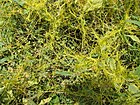Note: This is a project under development. The articles on this wiki are just being initiated and broadly incomplete. You can Help creating new pages.
Difference between revisions of "Cuscuta reflexa"
(→Identification) |
(→References) |
||
| Line 68: | Line 68: | ||
<ref name="chemical composition">[Chemistry]</ref> | <ref name="chemical composition">[Chemistry]</ref> | ||
| − | <ref name="Leaf"> | + | <ref name="Leaf">Kappatagudda - A Repertoire of Medicianal Plants of Gadag by Yashpal Kshirasagar and Sonal Vrishni, Page No. 151</ref> |
<ref name="How to plant/cultivate">[http://temperate.theferns.info/plant/Cuscuta+reflexa Cultivation]</ref> | <ref name="How to plant/cultivate">[http://temperate.theferns.info/plant/Cuscuta+reflexa Cultivation]</ref> | ||
Latest revision as of 10:47, 5 May 2021
Cuscuta reflexa is a Perennial It is harvested from the wild for local use as a medicine.
Contents
- 1 Uses
- 2 Parts Used
- 3 Chemical Composition
- 4 Common names
- 5 Properties
- 6 Habit
- 7 Identification
- 8 List of Ayurvedic medicine in which the herb is used
- 9 Where to get the saplings
- 10 Mode of Propagation
- 11 How to plant/cultivate
- 12 Commonly seen growing in areas
- 13 Photo Gallery
- 14 References
- 15 External Links
Uses
Fevers, Body pains, Itchy skin, Jaundice, Muscle pain, Coughs.
Parts Used
Stem.
Chemical Composition
Common names
| Language | Common name |
|---|---|
| Kannada | Akaashaballi |
| Hindi | Amarbel |
| Malayalam | NA |
| Tamil | Kodiyagundal |
| Telugu | Sitamma Pogunulu |
| Marathi | NA |
| Gujarathi | NA |
| Punjabi | NA |
| Kashmiri | NA |
| Sanskrit | Akashavalli |
| English | Airplant |
Properties
Reference: Dravya - Substance, Rasa - Taste, Guna - Qualities, Veerya - Potency, Vipaka - Post-digesion effect, Karma - Pharmacological activity, Prabhava - Therepeutics.
Dravya
Rasa
Guna
Veerya
Vipaka
Karma
Prabhava
Habit
Identification
Leaf
| Kind | Shape | Feature |
|---|---|---|
Flower
| Type | Size | Color and composition | Stamen | More information |
|---|---|---|---|---|
| White | In umbellate clusters or short racemes, bracteates, Bracts ovate-oblong | {{{5}}} |
Fruit
| Type | Size | Mass | Appearance | Seeds | More information |
|---|---|---|---|---|---|
| Capsules | Globose | Large seeds | Black in colour |
Other features
List of Ayurvedic medicine in which the herb is used
Where to get the saplings
Mode of Propagation
How to plant/cultivate
We have virtually no information on this species and do not know if it will be hardy in Britain.[3]
Commonly seen growing in areas
Parasitic on Desmodium spp, Rubus spp, Viburnum spp, Zizyphus jujube.
Photo Gallery
References
- ↑ [Chemistry]
- ↑ Kappatagudda - A Repertoire of Medicianal Plants of Gadag by Yashpal Kshirasagar and Sonal Vrishni, Page No. 151
- ↑ Cultivation
External Links
Categories:
- Ayurvedic Herbs known to be helpful to treat Fevers
- Ayurvedic Herbs known to be helpful to treat Body pains
- Ayurvedic Herbs known to be helpful to treat Itchy skin
- Ayurvedic Herbs known to be helpful to treat Jaundice
- Ayurvedic Herbs known to be helpful to treat Muscle pain
- Ayurvedic Herbs known to be helpful to treat Coughs
- Herbs with Stem used in medicine
- Herbs with common name in Kannada
- Herbs with common name in Hindi
- Herbs with common name in Tamil
- Herbs with common name in Telugu
- Herbs with common name in Sanskrit
- Herbs with common name in English
- Habit - Perennial
- Index of Plants which can be propagated by Seeds
- Herbs that are commonly seen in the region of Parasitic on Desmodium spp
- Herbs that are commonly seen in the region of Rubus spp
- Herbs that are commonly seen in the region of Viburnum spp
- Herbs that are commonly seen in the region of Zizyphus jujube
- Herbs
- Pages without herbs images



